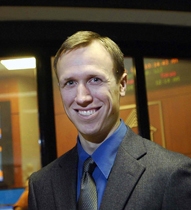SFI Collective Intelligence Short Course 201 - Faculty 2017
From Santa Fe Institute Events Wiki
Collective Intelligence, Markets & Prediction Short Course
October 12-13, 2017 - New York City, New York
DIRECTOR

Photo: Gabriella Marks
Short Course Director Jessica Flack
Jessica Flack is a professor at SFI where she also runs the Collective Computation Group. The focus of C4 research is on fundamental problems in evolutionary theory concerning collective behavior, collective computation, and collective intelligence—at all levels of biological organization—from societies of cells to societies of individuals to machine-human hybrid societies. C4 researchers use insights and tools from statistical physics, information theory, evolutionary theory, biology, cognitive science, complexity science, animal behavior, and theoretical computer science.
Read more about Flack's research on Quanta Magazine: How Nature Solves Problems Through Computation
FACULTY
Kent Daniel
Professor of Business, Columbia Business School

Kent Daniel is the William von Mueffling Professor of Business in the Finance and Economics Division at the Graduate School of Business at Columbia University. From 1996 to 2006, Kent was at the Kellogg School of Management at Northwestern University, where he was the John and Helen Kellogg Distinguished Professor of Finance (on leave from 2004-2006). Previously, he served on the faculties of the University of Chicago and the University of British Columbia.
Cade Massey
Practice Professor in the Wharton School’s Operations, Information and Decisions Department, The University of Pennsylvania

Cade Massey is a Practice Professor in the Wharton School’s Operations, Information and Decisions Department. He received his PhD from the University of Chicago and taught at Duke University and Yale University before moving to Penn. Massey’s research focuses on judgment under uncertainty – how, and how well, people predict what will happen in the future. His work draws on experimental and “real world” data such as employee stock options, 401k savings, the National Football League draft, and graduate school admissions. His research has led to long-time collaborations with Google, Merck and multiple professional sports franchises. Massey’s research has been published in leading psychology and management journals, and covered by the New York Times, Wall Street Journal, Washington Post, The Economist, and National Public Radio.
He has taught MBA and Executive MBA courses for 15 years, receiving teaching awards for courses on negotiation, influence, organizational behavior and human resources. He also co-teaches Wharton's “People Analytics” MOOC on Coursera. Massey is faculty co-director of Wharton People Analytics, co-host of “Wharton Moneyball” on SiriusXM Business Radio, and co-creator of the Massey-Peabody NFL Power Rankings for the Wall Street Journal. He lives in Center City Philadelphia.
Michael Mauboussin
BlueMountain Capital Management, Director of Research; The Santa Fe Institute, Chairman of the Board

Prior to joining BlueMountain, Michael J. Mauboussin was Head of Global Financial Strategies at Credit Suisse and Chief Investment Strategist at Legg Mason Capital Management. He is also the author of three books, including More Than You Know: Finding Financial Wisdom in Unconventional Places, named in the The 100 Best Business Books of All Time by 800-CEO-Read.
Michael has been an adjunct professor of finance at Columbia Business School since 1993, and received the Dean's Award for Teaching Excellence in 2009 and 2016. He is also chairman of the board of trustees of the Santa Fe Institute, a leading center for multi-disciplinary research in complex systems theory.
Scott Page
The University of Michigan – Ann Arbor, Leonid Hurwicz Collegiate Professor of Complex Systems, Political Science, and Economics; The Santa Fe Institute, External Faculty

Scott Page's research focuses on the myriad roles that diversity plays in complex systems. For example, how does diversity arise? Does diversity make a system more productive? How does diversity impact robustness? Does it make a system prone to large events?
He has written three books: The Difference, which demonstrates the benefits and costs of diversity in social contexts, Complex Adaptive Social Systems (with John Miller), which provides an introduction to complexity theory, and, most recently, Diversity and Complexity, which explores the contributions of diversity to complex systems.
He has also published papers in a variety of disciplines including economics, political science, computer science, management, physics, public health, geography, urban planning, engineering, and history. In addition to writing papers and books, he has also filmed a video course on complexity called Understanding Complexity.
Rajiv Sethi
Barnard College, Columbia University; The Santa Fe Institute, External Professor

Rajiv Sethi is a Professor of Economics at Barnard College, Columbia University and an External Professor at the Santa Fe Institute. His research areas include microeconomics and game theory, with applications to prediction markets, communication, crime, and inequality. He is on the editorial boards of the American Economic Review and Economics and Philosophy, and is a founding member of CORE (Curriculum Open-Access Resources for Economics), an organization dedicated to the production of high-quality resources for the teaching of economics, distributed free of charge worldwide under a Creative Commons license.
Shyam Sunder
Yale School of Management, James L. Frank Professor of Accounting, Economics, and Finance

Shyam Sunder is James L. Frank Professor of Accounting, Economics and Finance at Yale School of Management, and a pioneer in experimental economics. His research on information in financial markets and macroeconomics has appeared in over 200 articles in prestigious accounting, economics and finance journals. His inquiry (with D. Gode) into structural properties of markets using zero- or minimally intelligent agents was a seminal innovation whose applications have spread to computer science, engineering, finance, artificial intelligence, e-commerce, and other disciplines. His tenth book, Risky Curves: On the Empirical Failure of Expected Utility, co-authored with Dan Friedman, Mark Isaac and Duncan James, was published in 2014.
James Surowiecki
Journalist, staff writer at The New Yorker

James Michael Surowiecki is an American journalist. He was a staff writer at The New Yorker, where he wrote a regular column on business and finance called "The Financial Page".
Paul Tetlock
Columbia University Professor

Paul Tetlock is a Professor in the Business, Finance and Economics Division at Columbia University.
Anita Williams Woolley
Carnegie Mellon University, Associate Professor of Organizational Behavior and Theory Tepper School of Business

Anita Williams Woolley's research and teaching interests include collaborative analysis and problem-solving in teams; online collaboration and collective intelligence; and managing multiple team memberships. Her research has been published in Science, Organization Science, Academy of Management Review, Journal of Organizational Behavior, Small Group Research, and Research on Managing Groups and Teams, among others. Her research has been funded by grants from the National Science Foundation, the U.S. Army Research Office, and private corporations.
She has served on the editorial board for Organization Science, Academy of Management Discoveries, and Small Group Research, and is a member of the Academy of Management, the Interdisciplinary Network for Group Research, and the Association for Psychological Science.
Jason Zweig
Personal Finance Columnist, The Wall Street Journal

Jason Zweig became a personal finance columnist for The Wall Street Journal in 2008. Zweig is also the editor of the revised edition of Benjamin Graham’s The Intelligent Investor (HarperCollins, 2003), the classic text that Warren Buffett has described as “by far the best book about investing ever written.” He is the author of Your Money and Your Brain (Simon & Schuster, 2007), one of the first books to explore the neuroscience of investing, and The Devil’s Financial Dictionary (PublicAffairs, 2015), a satirical glossary of Wall Street.

